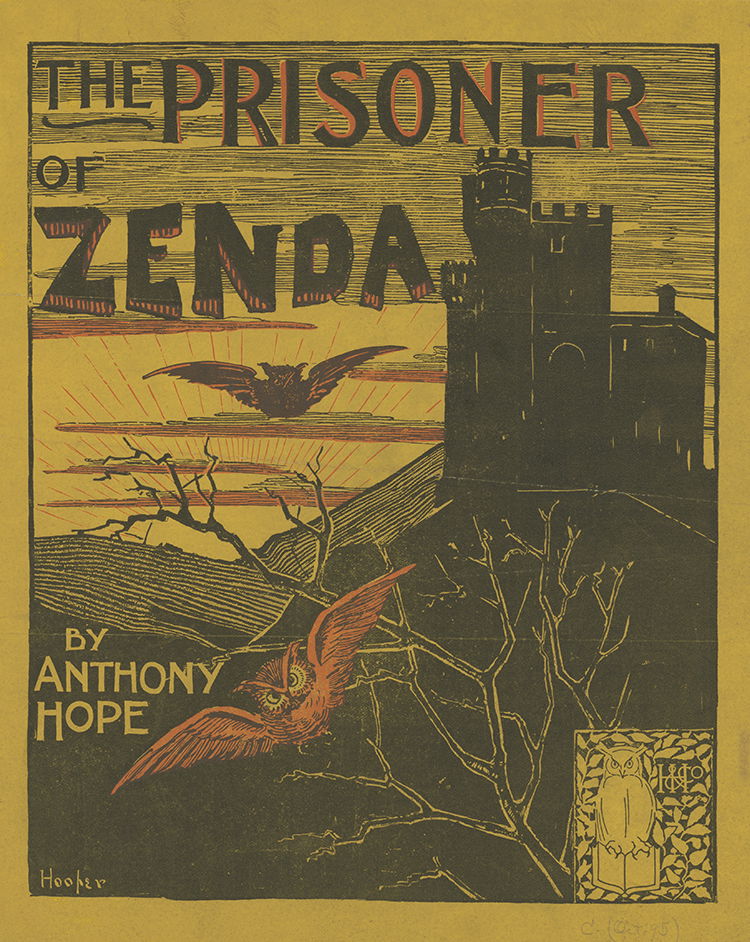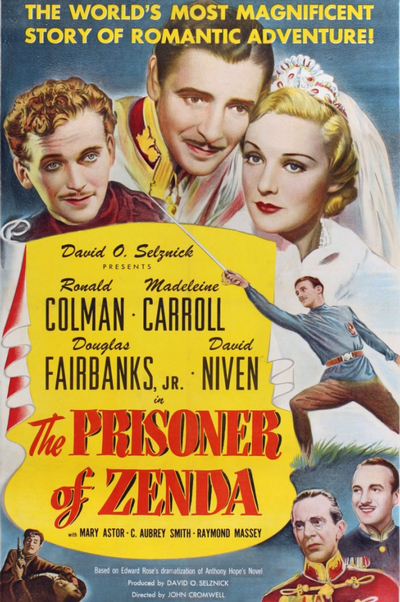

Oh, he is intense, he is dangerous – but where is the boyish, laughing charm? Where is the mad light in the eyes? Mason’s Rupert plots and threatens with the general allure of a Prussian junker… How can we believe that his enemies like him despite themselves? The fact that the movie is an almost scene-by-scene remake of the 1937 version doesn’t help, either. All else apart, in 1952 he was 44 – twice the character’s age – and looked older. What about James Mason, then? Alas… Let me say first that I like James Mason – but I’m afraid Rupert was not his cup of tea. And yet one can’t help liking him as he cheerfully betrays whomever happens to be in the way, manipulates enemies and friends, duels with great flair and resents Rassendyll’s slights… For my money, this is Rupert of Hentzau. Under the smooth insolence and the sunny smiles, this Rupert is dangerous. His Rupert is a charming, devil-may-care young fellow with a ready laugh and a readier knife – and he is quite mad. A tighter script helps, but Fairbanks is truly wonderful.

Nearly- but nearly, as Rassendyll tells Rupert during the duel in the last chapter of the sequel, isn’t quite.įast forward fifteen years, then, to John Cromwell’s 1937 The Prisoner of Zenda, with 28-year-old Douglas Fairbanks, Jr. Ingram, Mary O’Hara and Novarro get Rupert nearly right.

There is nothing to clash with the man in the book. This Rupert clearly enjoys himself a good deal. He smirks, he blows clouds of smoke, he quizzes duller people (that is, everyone else) through his monocle, he cocks an eyebrow to the camera, he delivers drugged wine, he knifes obnoxious princes in the ribs – all with a nice air of urbane and amused arrogance. Then again, the masquerade is far from innocent, and Novarro’s Rupert likes his mischief to be of the lethal variety. He manages to look older and more sophisticated than Fritz von Tarlenheim – but often young Hentzau comes across as a mischievous boy masquerading to fit in a world of older men. Novarro is 23 – just the right age – and one gets the sense that his Rupert, with his monocle, goatee, walking stick, cigarettes, and dandyish ways, is trying to appear older. Let’s begin with Ramon Novarro in the 1922 Ingram version.
The prisoner of zenda 1913 series#
and James Mason, Farley Granger and Peter Wyngarde – but since all the silent versions before 1922 are either lost or buried in the Library of Congress, and old TV series are not terribly easy to come by, I’ll have to confine myself to only three Ruperts. Between 19 he was played by Walter Hale, Gerald Ames, Ramon Novarro, Douglas Fairbanks, Jr. It follows that, when bringing this story and its sequel to the screen, the casting of Rupert is a rather crucial choice. While both narrators (Rassendlyll himself and his friend Fritz) take pains to inform us that he is a cheat, a liar, a womanizer and a murderer, that his wicked ways have broken his poor mother’s heart, and that he is evil in every possible way, they also spend a lot of words rhapsodising over young Rupert’s cleverness, charm, reckless bravery, beauty, superior horsemanship & swordmanship… Why, even his enemies can’t help liking the young rogue. Charming, reckless, and with the moral compass of a coat-hanger, Rupert is easily the best character in the book- and in the sequel as well. Unlike the hero Rudolf Rassendyll and his Ruritanian friends, the boy does not behave as a gentleman should – but, unlike them, he is certainly never boring. It is a pet theory of mine that Hope’s intentions for Rupert may have gone a bit overboard. Why, the sequel is even called “Rupert of Hentzau”… Thus enter stage Rupert of Hentzau, in Chapter Twelve of Anthony Hope’s The Prisoner Of Zenda – after which he walks away with the book and never returns it. So declared young Rupert with an insolent smile on his curling upper lip and a toss of his thick hair-he was a handsome villain, and the gossip ran that many a lady had troubled her heart for him already. Young Rupert, who looked a dare-devil, and could not have been more than twenty-two or twenty-three, took the lead, and made us the neatest speech, wherein my devoted subject and loving brother Michael of Strelsau, prayed me to pardon him for not paying his addresses in person, and, further, for not putting his Castle at my disposal the reason for both of these apparent derelictions being that he and several of his servants lay sick of scarlet fever, and were in a very sad, and also a very infectious state. This post is part of the Swashathon!, “a wild and adventurous event featuring the finest swashbucklers in the history of cinema”, hosted by Fritzi Kramer’s wonderful Movies Silently to celebrate the movie début of Douglas Fairbanks – right 100 years ago.


 0 kommentar(er)
0 kommentar(er)
